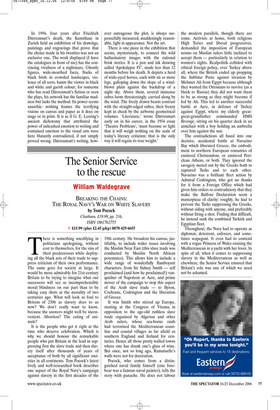The Senior Service to the rescue
William Waldegrave
BREAKING THE CHAINS: THE ROYAL NAVY’S WAR ON WHITE SLAVERY by Tom Pocock Chatham, £19.99, pp. 216, ISBN 1861762755 ✆ £15.99 (plus £2.45 p&p) 0870 429 6655 There is something unedifying in politicians apologising, without cost to themselves, for the sins of their predecessors while deploying all the black arts of their trade to suppress criticism of their own performance. The same goes for society at large. It would be more admirable for 21st-century Britain to be trying to imagine what our successors will see as incomprehensible moral blindness on our part than to be taking easy shots at the morality of two centuries ago. What will look as foul to Britons of 2306 as slavery does to us now? We don’t really want to know, because the answers might well be inconvenient. Abortion? The eating of animals?
It is the people who get it right at the time who deserve celebration. Which is why we should honour the remarkable people who put Britain in the lead in suppressing first the slave trade and then slavery itself after thousands of years of acceptance of both by all significant societies in all continents. Tom Pocock’s latest lively and well-researched book describes one aspect of the Royal Navy’s campaign against slavery in the first decades of the 19th century. He broadens his canvas, justifiably, to include wider issues involving the Muslim Near East (this slave trade was conducted by Muslim North African potentates). This allows him to include a wide range of wonderfully flamboyant characters, from Sir Sidney Smith — self proclaimed (and how he proclaimed!) vanquisher of Napoleon at Acre, and prime mover of the campaign to stop this aspect of the Arab slave trade — to Byron, Cochrane, Codrington and the liberation of Greece.
It was Smith who stirred up Europe, starting at the Congress of Vienna, in opposition to the age-old ruthless slave trade organised by Algerian and other Arab rulers, whose sea-borne raids had terrorised the Mediterranean coastline and coastal villages as far afield as southern England and Ireland for centuries. Hence all those pretty walled towns where one has drunk one’s glass of wine. But once, not so long ago, Ramatuelle’s walls were not for decoration.
Pocock, who comes from a distinguished naval family himself (one forebear was a famous naval painter), tells the story with panache. He does not labour the modern parallels, though there are some. Activists at home, both religious High Tories and liberal progressives, demanded the imposition of European norms on Muslim rulers little inclined to accept them — particularly in relation to women’s rights. Realpolitik collided with ethical foreign policy, over Turkey above all, where the British ended up propping the Sublime Porte against invasion by Mehmet Ali from Egypt because although they wanted the Ottomans to survive (as a block to Russia) they did not want them to be as strong as they might become if led by Ali. This led to another successful battle at Acre, in defence of Turkey against Egypt, where my elderly greatgreat-grandfather commanded HMS Revenge, sitting on his quarter deck in an armchair with a boy holding an umbrella over him against the sun.
The contradictions all fused into one decisive, accidental battle at Navarino Bay which liberated Greece, the embodiment to northern European romantics of enslaved Christendom, or enslaved Periclean Athens, or both. They ignored the savagery meted out by the Greeks both to captured Turks and to each other. Navarino was a brilliant fleet action by Admiral Codrington, who got no thanks for it from a Foreign Office which had given him orders so contradictory that they make the Balfour Declaration seem a masterpiece of clarity: roughly, he had to prevent the Turks suppressing the Greeks, without siding with anyone, and preferably without firing a shot. Finding that difficult, he instead sank the combined Turkish and Egyptian fleet.
Throughout, the Navy had to operate as diplomat, deterrent, enforcer, and sometimes scapegoat. It even had to contend with a rogue Princess of Wales cruising the Mediterranean in a yacht with her lover. In spite of all, when it comes to suppressing slavery in the Mediterranean as well as elsewhere, the Senior Service ensured that Britain’s role was one of which we need not be ashamed.






































































































































 Previous page
Previous page